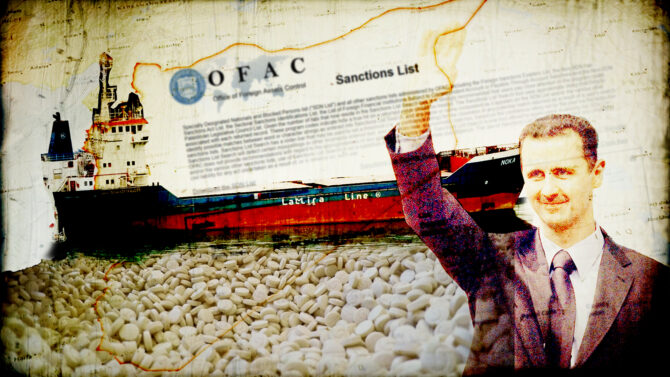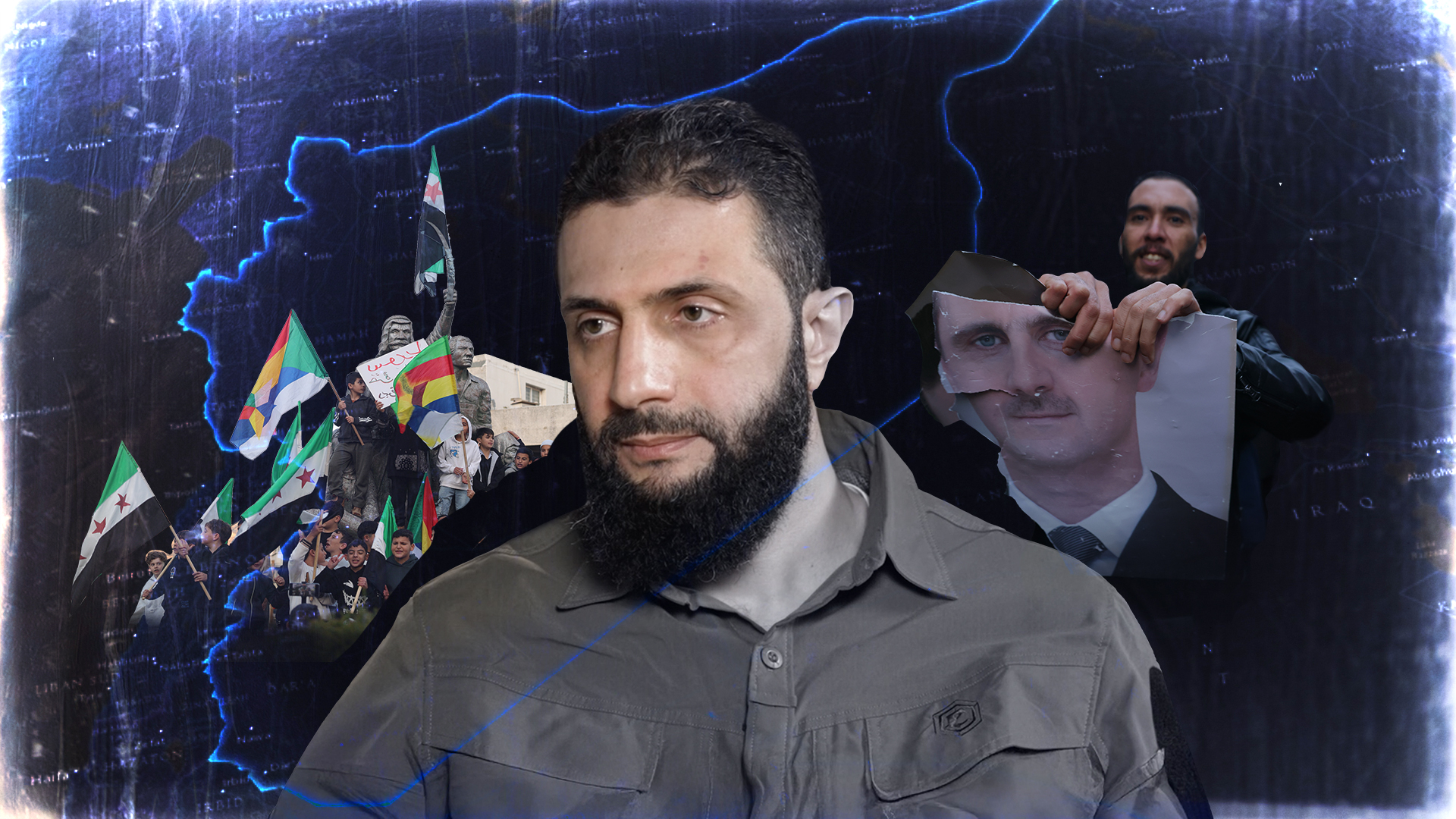Where did Hayat Tahrir al-Sham and its leader, who is playing a leading role in toppling the Assad regime, come from? The first years in Iraq, the “divorce” from al-Qaeda and the next day. Dr. Hans-Jakob Schindler, Senior Director of the Counter Extremism Project and former Coordinator of the UN Security Council, talks to iMEdD.
The Islamist group Hayat Tahrir al-Sham (HTS) has been at the forefront of international news over the past 24 hours following its advance on Damascus and the December 8, 2024 toppling of the Assad regime after five decades in power. HTS appears to be leading the coalition of rebel units in Syria that launched an offensive against government forces two weeks ago from the city of Idlib in the northwest of the country.
The organization has had close ties to al-Qaeda in the past and has been on the UN sanctions list since 2018, while being designated a terrorist organization by the US, UK and other governments.
However, the organization itself and its leader, Abu Mohammed al-Jolani, present themselves as moderates and a legitimate force that respects the rights of Syria’s various ethnic groups.
Dr. Hans-Jakob Schindler, a diplomat with years of experience in Middle East affairs, former coordinator at the UN Security Council and now director of the Counter Extremism Project, a non-profit organization with offices in New York and Berlin, tells iMEdD that it will take time to prove that the shift away from Islamic extremism advocated by HTS is sincere.
The early years
“The group’s history is really also the current leader’s history,” says Dr. Schindler, highlighting al-Jolani’s role in the creation and development of the organization.
Al-Jolani, who for the past few days has been using publicly his real name, Ahmed Hussein al-Shara, was born in 1982 in Riyadh, the capital of Saudi Arabia, and is of Syrian descent. During his childhood, his father was imprisoned three times and worked for ten years in the Saudi Ministry of Petroleum in the 1980s. According to the BBC, al-Jolani returned to his homeland at the age of seven and grew up in the capital, Damascus.
As he said in an interview with the American PBS network in 2021, he was influenced by the Second Palestinian Intifada and began to study the Quran.
In 2003, al-Jolani fought in Iraq against US forces that invaded the country. It appears that he joined al-Qaeda at that time. “He spent some time in American prison camps, as did most of these terrorists in the regions at that time,” Dr. Schindler said.
As al-Jolani himself admitted in an interview with the American PBS, he spent a total of five years in various prisons in Iraq.
The Al-Nusra Front
After his release, al-Jolani returned to Syria and in 2011 founded HTS’s predecessor organization, the Al-Nusra Front. The eventual leader of the Islamic State –and, at the time, the leader of al-Qaeda in Iraq– Abu Bakr al-Baqdadi appears to have contributed to this.
“Once the Syrian civil war really kicked into high gear Al Nusra was then the official affiliate of al-Qaeda in Syria,” notes the Senior Director of the Counter Extremism Project.
Assad’s people in Crete and Glyfada

A shipment of 3 million “jihadist pills” and a travel agency in the southern suburbs of Athens.
“Do whatever you need to do to survive in Syria”
In 2016, al-Jolani decided to separate his organization from al-Qaeda. Dr. Schindler was working as a Coordinator for the ISIL, al-Qaeda and the Taliban Monitoring Team at the UN Security Council at the time and had seen al-Jolani’s relevant communications with the leadership of al-Qaeda.
As he tells iMEdD, al-Jolani wanted to distance himself from al-Qaeda, fearing the increasingly intense international operations against the so-called Islamic State in the region.
“He asked the leadership of al-Qaeda in Afghanistan for permission to split off Al Nusra Front from al-Qaeda,” says Dr. Schindler. “And the answer from Afghanistan was: “you do whatever you need to do to survive in Syria at this particular point,”” he notes.
“That separation that everyone is talking about now was a very tactical decision, not an ideological conversion of al-Jolani,” he continues.
In January 2017, al-Jolani founded Hayat Tahrir al-Sham. This new organization has claimed from the outset that its activities are focused on Syria, with the aim of overthrowing the Assad regime and imposing Islamic law in the country. In doing so, it sought to distinguish itself from al-Qaeda and the Islamic State, which are international in character and action.
The organization conquered territories and made the northern region of Idlib city its base, turning its attention to local governance and trying to build basic public services and state structures. It wanted to present itself to the international community as a legitimate –and governing– power. It gradually became the de facto local government and emerged as one of the strongest rebel forces against the Assad government.
In an attempt to distance itself from organizations considered terrorist, HTS clashed with al-Qaeda, Islamic State and other extremist groups in the areas it controlled.
In January 2022, the Syrian Network for Human Rights issued a report highlighting serious concerns about human rights violations in areas controlled by the organization.
In 2018, the US and UN designated HTS a terrorist organization. The US State Department said in a statement that “Al Nusra Front created HTS as a vehicle to advance its position in the Syrian uprising and its objectives as an affiliate of Al Qaeda.” To date, the US has offered a reward of ten million dollars for al-Jolani.
In an interview with CNN in early December, al-Jolani said that the labelling of him and his organization as terrorists was “primarily political” and “wrong”, and called for him to be judged “not by words but by deeds”.
The next day
After the capture of Damascus on December 8, al-Jolani spoke at the Umayyad Mosque, one of the oldest mosques in the world, and talked about the hard work that will be needed to rebuild Syria as “a beacon for the Islamic nation.”
It is not yet clear, however, what HTS’s relationship will be with other armed groups, notably the Kurds and the Turkish-backed Syrian National Army, which according to Dr. Schindler are the three main “players” in the post-Assad era.
“How will power be divided between the Kurds, HTS and the Syrian National Army? What stance will they take against the Islamic State? Will there be an alliance to fight it? All this is not yet clear,” he says.
Questions remain, however, about the identity of HTS itself. Is al-Jolani’s “divorce” from al-Qaeda and his jihadist past sincere?
Dr. Schindler isn’t so sure. “It always was and continues to be a very extremist Islamist organization,” he tells iMEdD.
In the wake of recent developments and the toppling of the Assad regime, the British government is reportedly considering removing HTS’s terror designation, while relevant discussions are also reportedly taking place at the UN level.
“I don’t think it’s going to be an easy thing to remove,” points out Dr. Schindler, regarding the designation of HTS as a terrorist organization. “HTS will have to really show, and not just by saying they don’t want it, but by actively engaging with the international community in particular when it comes to counter-terrorism.”
